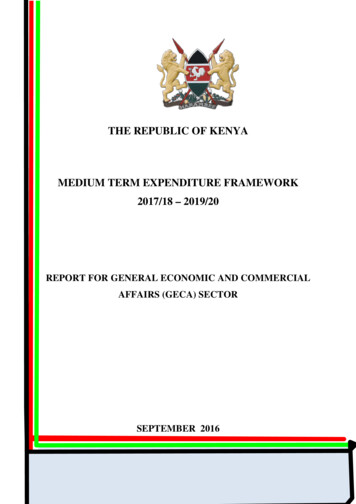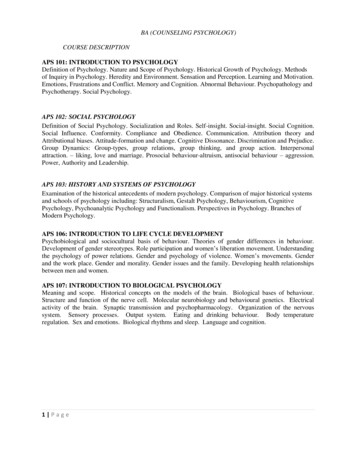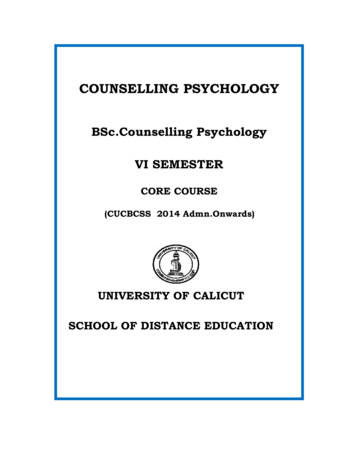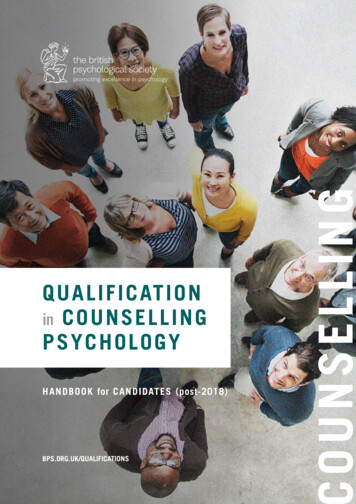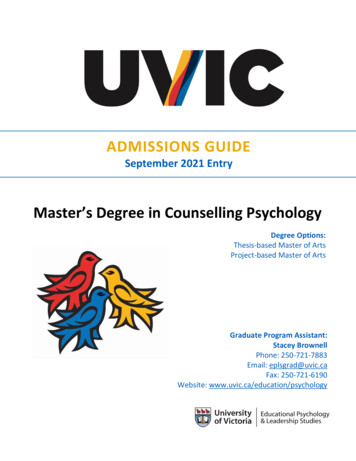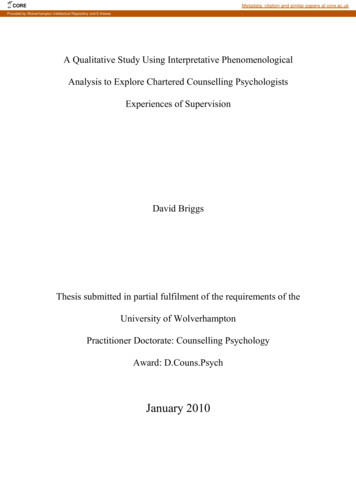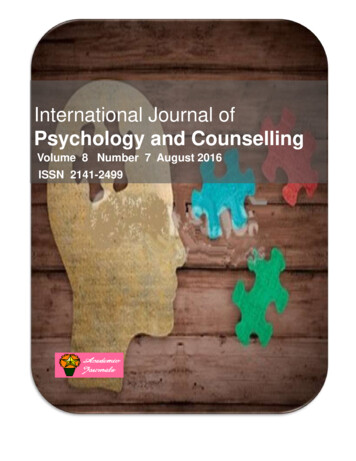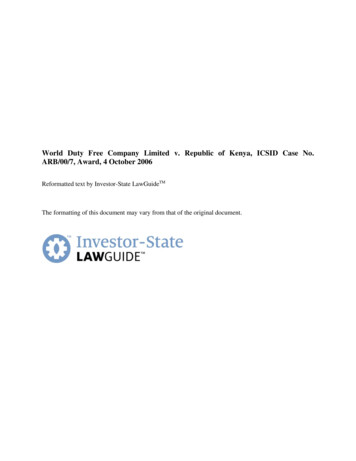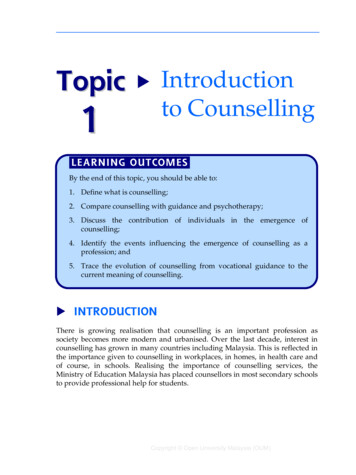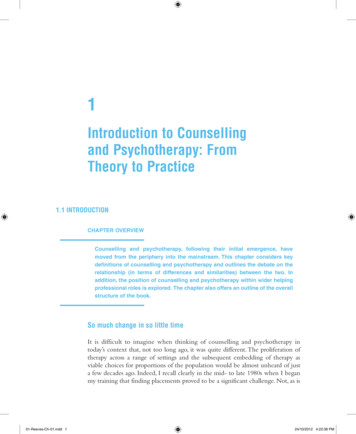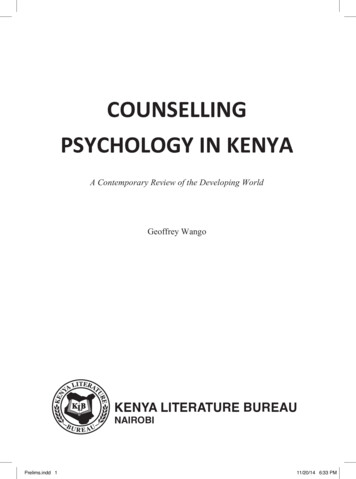
Transcription
COUNSELLINGPSYCHOLOGY IN KENYAA Contemporary Review of the Developing WorldGeoffrey WangoKENYA LITERATURE BUREAUNAIROBIPrelims.indd 111/20/14 6:33 PM
KENYA LITERATURE BUREAUP.O. Box 30022-00100, NairobiWebsite: www.klb.co.keE-mail: info@klb.co.ke Wango GeoffreyAll rights reserved. No part of this book may be reproduced, stored in a retrievalsystem or transcribed in any form or by any means, electronic, mechanical,photocopying, recording or otherwise, without the prior written permission of thepublisher.ISBN 978-9966-10-334-5First published 201 KLB 11718 2M 201 Published and printed by Kenya Literature BureauPrelims.indd 211/20/14 6:33 PM
ForewordCounselling psychology services is the subject of intense, renewedpolicy interest internationally. In Kenya, a range of surveys into theprovision of psychological counselling services in schools, hospitals,churches, rehabilitation centres, prisons and other areas testify to thisrecent resurgence. In Voluntary Counselling and Testing for HIV andAIDS as well as in Anti-Retroviral Therapy (ART), counselling isgaining popularity as a non-stigmatising form of emotional support. Onthe legal front, the new constitution promulgated on 27th August, 2010has led to several legislations as well as review of existing ones such asthe Children’s Act, Sexual Offences Act, HIV and AIDS Prevention andControl Act and the Marriage Act. The social impact of these legislationswill determine and reshape counselling and psychological services inthe context of a more radical and dynamic society.Counselling, psychiatric and psychological services appear to be onan upswing on a demand-led basis provided predominantly by a widerange of professionals including counsellors, psychiatrists, psychologists,psychotherapists and social workers. Unfortunately, unlike other formsof service provision, counselling does not appear to fully possess a solidstatutory base, with guidance from professionals and associations beingmore inspirational than mandatory. Research into provision of the servicehas also tended to be small-scale in nature, mostly covering sections ofpeople or institutions more usually, the single client. This lack of reliableinformation on psychological counselling services in Kenya and otherparts of the developing world has hindered the setting up of professionalstandards as is the situation in more developed countries such as theUnited Kingdom and the US.Prelims.indd 311/20/14 6:33 PM
This book seeks to bridge this gap by identifying the main features ofpsychological counselling and by exploring the potential contribution ofthe service to the betterment of society.For purposes of discussions, counselling psychology is definedas a contracted therapeutic process carried out between a client and acounsellor for the benefit of the client. The chosen preference focus ismore on the individual rather than group counselling. This is becausecounselling psychology springs from, and is inspired by, those who elevatean understanding of self and other psychology.Like in other developing countries, the provision of counselling andother psychological services in Kenya appears to be relatively widespread,based on widely varying patterns of provision, largely ad hoc and demanddriven. Agreement on the format and appropriate standards of provisionis also limited.There is a wide range of patterns in terms of how people accesscounselling and psychological services, and varying levels ofconfidentiality with child protection and human rights concerns identifiedas some of the major challenges (Wango, 2007a; 2007b). Though theservice is widely perceived as having definite, personal, emotional,spiritual, behavioural, educational, psychological and social benefits,(Tumuti, 1995; Njoka, 2007; Wango, 2009; 2010; 2011; 2014), it hasfaced criticism owing to the professional complexity of managing it withincommunities and organisations.The style adopted in the book is interactive, mainly becausecounsellors should use interactive communication. This is informed bythe fact that the world of counselling is dynamic with new insights andunderstanding unfolding all the time. By being interactive, the bookinvites the reader to join in the discussion on the key issues covered bythe professions of counselling and psychology such as the perceivedbenefits of client-based counselling. These are explored within thePrelims.indd 411/20/14 6:33 PM
framework of the envisaged structural changes and the restructuringof services that will in future present major challenges to the positionof counselling psychology within the new structures. These, includingpressure on therapeutic confidentiality via information sharing, will bea marked shift towards working with individual clients in organisations,consequently redefining professional approaches. Established professionalcounselling and international perspectives will be definitely challengedby proposed information-sharing requirements, and by greater emphasison the achievement of measurable behavioural outcomes. Counsellors,psychologists, psychiatrists and psychotherapists currently enjoying arelatively high degree of professional autonomy in their practice anddecision-making, could find themselves drawn much more closely intomulti-professional ways of working, where the pressure to deal withculture and traditional boundaries could, in turn, become significantlyincreased. Managing this process of change may present both risks andopportunities if provision of psychological counselling is to move into afirm, statutory setting in the near future.Prelims.indd 511/20/14 6:33 PM
PrefaceThe title of this book: Counselling Psychology in Kenya: AContemporary Review of the Developing World that covers awide range of social and mental health may as well seem obscure, but,when duly interpreted, is meant to sum up the series of convictions outof which it is written. Firstly, there is strong evidence of the potentialbenefit of psychological treatment to individuals with a wide range ofsocial and mental health problems. Secondly, the emerging professionof psychological counselling in Kenya, as in other developing countries,will have to absorb and adapt to undergoing rapid and profounddevelopment of both substantive and organisational orders. Thirdly, andarising from two above, even the organisational changes will affect to agreat extent various aspects of life and professions including counsellingand psychology will be more defined. In that case, those in the professionneed to inform ourselves better of these developments. Fourthly, relevantinformation including psychological counselling is more readilyavailable for reference purposes. Finally and ultimately, decisions willneed to be made about professional counselling psychology – hence thefirst part of the title.Even after such a diligent search, the shape of the future of counsellingpsychology as a profession will need to be carefully interpreted in context– hence the second part of the title. This book is, therefore, in two parts:selective gathering and presenting of the main elements of psychologicalcounselling, and then, on that basis, integrating characteristics on thebroad range of content on the future and its corresponding impacton psychological counselling and psychotherapy in Kenya, Africaand internationally. This is to locate the profession of counsellingPrelims.indd 711/20/14 6:33 PM
psychology within the wider historical, social and occupational context.Such an understanding would facilitate an enhanced understanding ofthe framework within which counselling psychology can, and wouldharmoniously operate.The book presents both enlightening and enriching insights intothe practice of counselling psychology and is written to assist thoseengaged in psychological counselling in an interpretative way. It isparticularly written for psychological counselling practitioners whoare also trainers, researchers and supervisors. Besides, it provides aframework and demonstrates application of professional counsellingand psychological services that have been honed through experience andconsultation with experts in the field. The perspective is, therefore, tomake available information that will be relevant as a resource while urgingprofessionalism in psychological counselling services provision. Whatconstitutes interpretative professional practice is the explicit explanatoryapproach, offering illuminating insights into professional psychology andcounselling practice and hence the development of a reflective awarenessthat contributes to quality psychological counselling services. The presentstatus is challenged with the aim of making it better because counselling,psychology, psychiatry and psychotherapy are always evolving.The book is divided into three parts. Part I is a background topsychological counselling and the profession of counselling. It commenceswith an introduction (Chapter 1) followed by an exploration of the helpingworld (Chapter 2), professionalism (Chapter 3) and the existing legalframework within which to place counselling (Chapter 4). Part II looks atthe major professional development issues in counselling psychology. Inseveral ways, there is need to engage all the professional practitioners –counsellors, psychologists and psychotherapists – more directly, with theperspectives and pragmatics of psychological counselling approach. In thatcase, it is necessary to understand the epistemological issues that guidethis approach. These are: who is a counsellor, counsellor competencePrelims.indd 811/20/14 6:33 PM
and accreditation (Chapter 5); professional ethical standards (Chapter6); the philosophical foundations or theoretical framework (Chapter7); and counselling in context including how outcome can be evaluated(Chapter 8).Part III looks at the future of counselling psychological services andis based on the assumption that it is not sufficient just to gain knowledgeof psychology and/or counselling; it is an opportunity for dialogueon the possible future trends in psychological counselling services(Chapter 9), challenges facing psychological counselling (Chapter 10)including the need for psychology, psychotherapy and counselling tohave a more fundamental legal framework (Chapter 11), with someconcluding thoughts (Chapter 12). The book brings to life the status quoof psychological counselling practice in Kenya and in the developingworld today, appreciating the milestones so far achieved, highlightingloopholes and challenges in practice and at the same time, suggesting aworkable chart forward that will inculcate professionalism.Each of the parts presents views that discuss procedures and issuesthat need to be considered in developing strategies for improvingpsychological counselling practices illustrating with suggestions on theway forward (in the appendices). The message presented throughout thebook is that psychological counselling services can be clearly defined,and the programmes can be delineated, enhanced and made morestringent, depending on the context, institutional strength for improvingpsychological counselling culture and values. Standards will become theflagship of professional psychological counselling programmes in thedeveloping world, Kenya included.Prelims.indd 911/20/14 6:33 PM
AcknowledgementThis book is a product of my Doctor of Philosophy (Ph.D) degreein Counselling. I am, therefore, grateful to the CommonwealthScholarship Commission who sponsored me for the study at theUniversity of Birmingham, United Kingdom.I wish also to appreciate my wife Lucy, and my daughters, Annabel,Joan and Angel. They have always been there for me, outstandingthroughout and a great source of strength.There are numerous people and organisations that actively participatedat different stages in the development of this book. I single out ProfessorPriscilla Kariuki of the Psychology Department,University of Nairobi, forher expertise, support, insight and knowledge in the subject matter. Prof.Michael Ndurumo, University of Nairobi, Dr. Sammy Tumuti, KenyattaUniversity and Dr. Catherine Gachutha, Maranatha Professional Collegeof Counselling, deserve special mention for their very useful insightinto counselling, psychology and psychotherapy professional servicesin Kenya.My thanks and appreciation are extended to all those who have helpedme to learn about the helping process and shared in their struggle to makesense of our world. These include my students at the University of Nairobi,teachers and students in schools, parents, employers and employees atvarious organisations who have continued to teach me more than I willever know.Several organisations offering counselling services in the country andinternationally also provided information. They include the AmericanCounselling Association (ACA), the British Association of CounsellingPrelims.indd 1111/20/14 6:33 PM
and Psychotherapy (BACP), Kenya Counselling & PsychologicalAssociation (KCPA) and the Kenyan Guidance, Counselling andPsychological Association (KGCPA).I also wish to acknowledge the following publications that formedan important component of some of the ideas: Adshead (2013); Bor andPalmer (2009); Feltham and Horton (2010); Gibson and Mitchell (2010);Jenkins and Polat (2006); Keithley and Marsh (1995); McLeod (1997);Stewart (2005); Wango (2006b; 2007a; 2007b); Wango and Mungai(2007) and Williamson (2008). I always liked the writings by ChinuaAchebe and consider them part of our well-to-do traditional heritage.Lastly, I would like to mention two columnists in the Sunday NationNewspaper, Yusuf K. Dawood Surgeon’s Diary and Gerry LoughranLetter from London that I always read and find very inspiring.Prelims.indd 1211/20/14 6:33 PM
onyms and AbbreviationsxxiLife’s JourneyxiiiList of TablesxxviList of FiguresxxviKey for TermsxxviiPART I: FOUNDING PRINCIPLES: THE GROWTH ANDUNDERSTANDING OF COUNSELLING PSYCHOLOGYChapter 1: Introduction: The Context of Counselling Psychology2Chapter 2: Beginnings: Social and Historical Context of Counselling182.0: Background to Counselling Psychological Services182.1: Brief History of Counselling and Psychotherapy202.1.1: Counselling in Traditional Societies212.1.2: Psychiatric Services in Kenya252.1.3: Guidance and Counselling in Schools in Kenya272.1.4: Counselling as a Living Heritage: Interface with CounsellingPsychologyPrelims.indd 153111/20/14 6:33 PM
2.2: Guidance322.3: Counselling332.4: Developments in Philosophy and Implications onCounselling Psychology372.5: Psychological Therapies: Counselling Psychology432.6: Types of Psychological Therapies and the Emergence ofCounselling Psychology472.7: Psychological Counselling Services in Kenya Today502.8: Conclusion53Chapter 3: Counselling as a Profession3.0: Introduction553.1: Professionalism: What is a Profession?563.2: The Counselling Process: What Happens in Counselling?593.3: Counselling Skills: The Use of Techniques in Therapy643.4: Role of Counselling Psychology663.5: The Art of Therapy in the Helping Process703.6: Mandated Therapy763.7: Conclusion79Chapter 4: Counselling: Legal Regulatory FrameworkPrelims.indd 1655804.0: Introduction804.1: International Context814.2: Kenyan Context834.3: Counselling Psychology and the Law934.4: Conclusion9511/20/14 6:33 PM
PART II: COUNSELLING PRACTICE: PROFESSIONALDEVELOPMENT IN COUNSELLING PSYCHOLOGYChapter 5: Counselling Competence: Counselling Accreditation andRegulation5.0: Introduction97975.1: Counsellor and Counselling: Who will Count as a Counsellor?985.1.1: Professional Counsellors, Psychologists and Psychotherapists1005.1.2: Use of Counselling and Helping Skills1005.1.3: Voluntary Counsellors or Helpers1005.1.4: Peer Support Networks1015.1.5: Informal Helpers1015.2: Counselling Competence: Accreditation, Licensing andCertification5.3: ConclusionChapter 6: Professional Ethical Standards for CounsellingPrelims.indd 171041161186.0: Introduction1186.1: Principles of Counselling1186.2: Issues in Counselling Psychology1216.2.1: Attitudes and Values1216.2.2: Role Diffusion, Status and Influence1226.2.3: Conflicting Philosophies and Concepts1236.2.4: Confidentiality in Counselling12411/20/14 6:33 PM
6.2.5: Sexual Relationships1286.3:Code of Standards and Ethics1296.4:Counselling Records1306.5:Conclusion131Chapter 7: Psychotherapeutic Approaches: Models of Counselling7.0: Introduction1327.1: Theories of Counselling1337.2: Psychotherapeutic Preferences in the Helping Process1387.2.1: Psychoanalytic Therapies1397.2.2: Behaviour Therapy1397.2.3: Cognitive Therapy1397.2.4: Humanistic Theorists1407.2.5: Systemic Therapy1407.2.6: Problem Solving or Solution Focused Therapy?1417.2.7: Feminist Therapy1427.2.8: Positive Psychology1427.2.9: Eclectic and Integrative Approaches1437.3: Other Approaches in Counselling Psychotherapies1507.3.1: Bibliotherapy1507.3.2: The Epistolary Method1547.3.3: Psychodrama1557.3.4: Play Therapy1567.3.5: Alternative Treatment1567.4: ConclusionPrelims.indd 1813215911/20/14 6:33 PM
Chapter 8: Counselling in Context: The Nature and Outcome ofCounselling1618.0: Introduction1618.1: Context for Counselling Psychological Services1618.2: Counselling in Different Contexts, Opportunities andTensions1658.3: Evaluating Counselling: Monitoring and Evaluation ofCounselling Psychological Services1728.4: Traditional Communal vis-à-vis Self in the Community1808.5: Conclusion182PART III: COUNSELLING PSYCHOLOGY AND THE FUTUREChapter 9: Future Development in Psychological Counselling Services185Prelims.indd 199.0: Introduction1859.1: Counselling Professional Association1859.2: Counsellor Training and Professional Development1899.3: Integration and Expansion of Psychological CounsellingServices1899.3.1: Engaging in Activities of Daily Living1939.3.2: Death, Dying and Bereavement1969.3.3: Trauma Counselling1989.3.4: Anxiety, Mood and Depression1999.3.5: Life Through the Life Cycle2019.3.6: Religion and Counselling20311/20/14 6:33 PM
9.3.7: Suicide, Assisted Suicide and Euthanasia2069.3.8: Time and Timeliness in Therapeutic Practice2099.4: Counselling Research2119.5: Counselling Supervision2189.6: Conclusion220Chapter 10: Developmental Themes and Challenges for CounsellingPsychology22110.0: Introduction22110.1: Towards the Reconstruction of Professional CounsellingServices22210.2: Counselling for Special Client Populations23910.3: Interface between Medicine and Therapy: PalliativeCare and Terminal Illness24710.4: Counselling Services and Community Home-based Carefor HIV and AIDS25810.5: Conclusion263Chapter 11: The Rise and Nice of Counselling11.0: Introduction26511.1: Specifications for Psychological Counsellors26611.2: Counsellor Consumer Programmes27411.3: Legal Regulations for Psychological Counselling Services28211.4: Philosophy of Life and Propensity to Live on Life’s Edge28611.5: ConclusionChapter 12: Conclusion and Final Reflections12.1: Counselling in a Changing WorldPrelims.indd 2026530330530511/20/14 6:33 PM
Geoffrey Wango1PART IFOUNDING PRINCIPLESTHE GROWTH AND UNDERSTANDING OFCOUNSELLING PSYCHOLOGYCounselling Psychology 1.indd 111/20/14 6:37 PM
2Counselling Psychology in KenyaChapter 1Introduction: The context of counsellingpsychologyAll great things are simple, and many can be expressed in singlewords: freedom, justice, honour, duty, mercy, hope.Sir Winston Churchill (1874 – 1965)Contextual Realities for Modern Counselling PsychologyThe counselling and psychotherapy profession is undergoingconsiderable change in the form of regulation, funding, efficacyand research. These changes are likely to challenge some of the basicthinking that has come to underpin this and other professions, and howcounselling psychology in particular can contribute to the developmentof improved healthcare systems now and in the future.The world has taken a different turn in the last millennium. Thereis a lot of emphasis on increased democratic rights, respect for andupholding of individual rights, amidst communality and improved healthyliving. This insistence on the uniqueness of the individual, coupled withtechnological development, the emergence of sects in major religions asspiritualism diminishes, the dominance of economic and market prices,expertise and professionalism is the reality of the modern global world.Civilisation and its ethics and ethos govern the lives of a vast majorityof people in this global village. Terrorism and the war on terror is a reality,especially after the September 11, 2001 attack of the hitherto impregnableWorld Trade Centre and the Pentagon. Conflict and war have reigned inCounselling Psychology 1.indd 211/20/14 6:37 PM
Geoffrey Wango3Somalia, Bosnia, Afghanistan, Iraq, Rwanda and in the Middle East. Theturmoil in the global market could trigger a cycle of global economicmeltdown. Global warming and environmental issues are a concern morethan ever in an uncertain world. The need for a helping profession is evermore pronounced.Technological development has added immeasurably to improvedcommunication and better medical care, but the net result is thecatastrophes caused by war, the misery caused by accidents, the apathyinduced by alcohol, drug abuse and other forms of addictions, and severaldiseases that induce immeasurable panic especially in a world ravagedby HIV/AIDS, cancer and other terminal illnesses. The world is on thefrontline of a new global war on terror. In such a society constantly underthreat and suspicion, frustrations, anxiety and emotional disturbanceabound and hence the need for psychological counselling.Recent events in Africa, including the Rwandan genocide (2000)that horrified the international community, war in Somalia, violence inDarfur (Sudan), the post-election violence in Kenya in (2007), strugglesfor democracy in Ivory Coast, Tunisia,Yemen and Egypt, violence inLibya, the Middle East conflict, violence in Mali and Cote d’Ivoire andriots by youth in the United Kingdom, among other events, once againhighlight the issues of inspired freedom, continued conflict and posttraumatic stress disorder (PTSD). Africa as a continent must build capacityto address and prevent crises.People who have experienced acts of terrorism, violence or fatalaccident are cognisant of their surroundings. But again, as persons andmore as counsellors, we must learn to make people aware that there isno hiding from these and other challenges in life. Needless to say, peoplefight dozens of visible but very real threats. For example, after the 1998American Embassy bombing in Nairobi and the 2002 Kikambala Hotelbombing, Kenya stepped up the fight against threats of terrorism at homeand abroad. Most recently, she has suffered another terrorist attack at theCounselling Psychology 1.indd 311/20/14 6:37 PM
4Counselling Psychology in KenyaWestgate Mall where tens of persons lost their lives. The war on terroris more than real though shrewd in shadows of secrecy. PsychologicalCounselling services are essential in war against an enemy that cannot bespotted in the first place, but if allowed to attack will lead to bloodshed,panic, long-lasting trauma and socio-economic damage.The advancement in studies on human development and humanrelations should, without doubt, create in us a more enhancedunderstanding of our human nature, rather than drive us apart to hatred andanarchy. Humans must be affluent in heart and united among diversity.Even issues of governance and accountability prominent in Africa are notgenetic; these are in many instances products of consequent regimes thathave perpetuated a culture that undermines the substance of humanityvalues and normality. This initiates a vicious cycle of inefficiency andinequality that in turn breeds poverty and inequalities. Even for us inAfrica and other developing countries with less socio-economic anddemocratic ideals, we must wake up to the reality of human essence;we cannot, should not continue to be our own inescapable prisoners ofour own self-induced misery. Counselling psychological services in thedeveloping world and in Africa must, therefore, be about the challengesof supporting and sustaining amicable solutions.Developed and Developing Countries – Brief NoteThe terms developed and developing world in this text are used inpreference to such terms as more or less developed, or First andThird World countries respectively. This is because there is no coherentand clear definition of more/less developed countries or as characteristicsamong countries are similar though diverse, high or low levels of percapita income, industrialisation or agricultural based economy anddeveloped or restricted infrastructure. Developing countries refersto countries outside Europe and North America, with the exceptionof Australia, China, New Zealand and Japan. Most of the developingcountries were former colonies of Europeans and their economy is moreCounselling Psychology 1.indd 411/20/14 6:37 PM
Geoffrey Wango5agriculture-based. Developing nations are usually characterised by highmortality rates, lower life expectancy, high birth rates, high levels ofpoverty, largely patriarchal systems and large gaps between the rich andpoor. There are deep-rooted and serious iniquities leading to ethnicity,racialism, nepotism, corruption, looting of public funds and classaffiliations. And though they share some similarities, they certainly havemany differences. Nonetheless, all will have assorted cultures, politicalsystems, economies, religions and aspirations.Most of the developing and poor countries are in Sub-SaharanAfrica (SSA). They are characterised by poor health systems, poorinfrastructure, high corruption, gender disparities, strong cultural linksand weak institutions that hinder effective management. Even with allthe money granted to these countries in form of loans and grant-inaid, and other strategies such as Structural Adjustments Programmes(SAPs), the situation has not qualitatively changed, particularly in therural areas and urban informal settlements. There are mud-walled andgrass-thatched buildings without clean water and electricity, as well aspoorly-equipped schools and health facilities. Many people still die frompreventable and treatable diseases like malaria, bilharzia, HIV and AIDS,cancer, meningitis, common cold and dysentery while expectant mothersdie during child birth. For example, cervical cancer is the second mostcommon cancer among women world-wide, with about 500,000 new casesand 250,000 deaths annually. Almost 20% of these occur in low-incomecountries. But even statistics on population, education, health and otherservices is difficult to obtain and is often varied between research andgovernment official statistics.The traditional social setting was interwoven with the way of life,consisting of the social system that engulfed religion, rites of passage,taboos, language, family, clan and community. This social settingprovided therapy. Today, the social setting is intertwined with anotherreligion (often Christianity and Islam), a modern culture, at times anotherCounselling Psychology 1.indd 511/20/14 6:37 PM
6Counselling Psychology in Kenyalanguage and a different setting. The more traditional societies will bemore attached to certain customary values and beliefs, and communalliving as contrasted to the modern living in developed and urban societies.But again, this distinction is rather vague. Even in Africa and Asia, it isoften difficult to tell if one is urban or rural, especially when one worksin the city and lives in the rural areas. Some people have two homes, arural and an urban one.Home may be a mindset, that ancestral place where you never uprootedthe pumpkin. The concept has origins of the colonial epoch as expatriateshad their own home apart from the colonies. Home and house came intogreater prominence when the late S. M. Otieno died and the Umira Kagerclan pursued a court case to have him buried at home and not in Nairobias the wife had anticipated. The ‘home’ phenomenon is best summed upin a fascinating way by Miguna (xi – xii), born and brought up in Nyanza,Kenya. Miguna describes the desire to relocate from Canada where hehad lived for many years thus:As a member of the Greater Luo community, tradition did notallow me to call that house at 97 Dépeuter Crescent a home. Yes,Bradford is where I had lived and managed to transform myselffrom a recently called member of the bar to a well-establishedlawyer; from an ingénue father to a family man with five beautifulchildren. For Luos, however, a home isn’t just where one livesor raises a family, no matter for how long you are there. To aLuo, a home is supposed to be where one’s mother ‘buried theplacenta’; where the umbilical cord is cut. But that is just half ofthe story because even Luos born in modern health facilities incities all over the world are still required to think of ‘home’ onlyas their ‘ancestral’ place – for Luos of Kenya this is the regionon the shores of Lake Victoria (Nam Lolwe) that the communitymigrated to centuries ago from Southern Sudan.Counselling Psychology 1.indd 611/20/14 6:37 PM
Geoffrey Wango7Miguna (xviii) and family did get ‘home’, but this time, ‘home’ ishis country of birth, Kenya though ‘home’ in the cultural sense is themotherland:We were home. Not ‘home’ in the cultural sense because I wasn’tgoing to settle down in Magina or Kisumu. But home becauseI was back in Kenya, my motherland. Emotionally, I was veryhappy. It had been many years. I had missed the food, the music,the landscape and the people, particularly the people. I haddeeply missed being able to speak my mother tongue withoutfeeling uncomfortable or looking over my shoulder. Politically,I felt ready to face the risks, challenges and opportunities thatlay ahead.The concept of home in traditional society is emotionally moreinvolving than we tend to allocate it in times of emotional turmoil. It ispart of family history that creates a sense of belongin
of psychology and/or counselling; it is an opportunity for dialogue on the possible future trends in psychological counselling services (Chapter 9), challenges facing psychological counselling (Chapter 10) including the need for psychology, psychotherapy and counselling to have a
